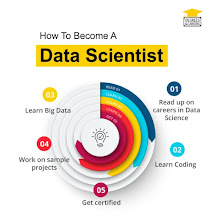According to recent industry trends, the data scientist job market has exploded, with data science being one of the most in-demand jobs. Many colleges are also introducing data science as a completely new programme. This shows that data analysis is already a critical role for businesses today. Data underpins every business decision. Financial organisations, in particular, are personalising customer experiences and combating fraud entirely with the help of data scientists’ important insights and assumptions. Last year, LinkedIn discovered that data analysis is one of the top three fastest-growing career categories, alongside software technology and digital content, which is unsurprising given that data science is expected to be one of the fastest-growing fields in the future. Considering this, AIM has compiled the best career advice given by industry leaders in the field.
“Aspiring data scientists have a promising future ahead. With the growing demand for data scientists and the current scarcity of skilled professionals in this field, organisations are offering attractive salary packages coupled with a host of other long-term incentives. To be successful, it’s important for data scientists to hone both their business and technical skills. Taking on upskilling courses in data mining and advanced analytics will be an added advantage to building a budding career in this field.” Mr Nirav Choksi, Co-founder & CEO, CredAble,
Read More: I am self taught data scientist
Tip 1: Understanding the various roles and career options in the industry
Data science is a broad term that encompasses a wide range of topics. Within the field, there are a variety of roles. The following are a few of the most common:
- Data analyst
- Data architect
- Data engineer
- AI/ ML engineer
According to Mr Tridib Mukherjee, Vice President, and Head, AI & Data Science, Games24x7
“Data Science, today, is so pervasive across sectors that it has become an integral part of the product journey. Organisations today not only hire professionals based on their data-crunching abilities, statistical conceptions, or modelling guidelines equipped in the offline or online mode, but also for more intense involvement of statistical analysis, machine learning fundamentals, or other algorithms as part of the product eco-system. These professionals understand the system, the product, the business, and how it all comes together and fits in. One needs to ask themselves what kind of data scientist they want to be.”
Tip 2: Specialisation in the correct domain
Specialists with extensive knowledge will be better suited to deal with these situations. One of the most crucial questions data scientists have to ask themselves is, “What career is best for me?”
According to expert Rajiv Kumar, HR Head, Witzeal
“The demand for skilled data scientists has been steadily pointing northward, particularly for those who can mine and interpret data. Multiple reports predict that India will have over 11 million jobs for data scientists by 2026. One can refer to numerous resources available online, including certification in Data Science (that are much more career-focused) if they want to start their career in data science. These courses provide an opportunity to gain in-depth knowledge about the most advanced skills and techniques like data analysis, machine learning, statistics, Tableau, Python, etc. However, professionals need to focus on developing their critical thinking, problem-solving, persuasive communications, great listening, and domain expertise for better success .
Read more: I am self taught data scientist
Tip 3: Strong background in mathematics and computer science
According to Mr Arvind Saraf, Head of Engineering, Drishti Technologies
“The best data scientists are able to solve problems by applying the right algorithms in the right order. That means that there is a big overlap between analytical skills and computer programming knowledge. The modern data scientist has to be able to program in Python, R, SQL and MATLAB. They have to understand databases and distributed systems, as well as probability theory and statistics. And they have to be able to get their hands dirty with a bit of applied math and machine learning.”
Hence, it becomes important that data scientists hold a solid background in mathematics, linear algebra and statistics, including applicability.
Tip 4: Building relevant industry experience
Mr Gaurav Vohra, Chief Business Officer, UNext Learning, claims that
“Aspirants need to understand what organisations are precisely looking for in a prospective candidate for the data scientist role. Companies either look for candidates with relevant past work experience as data experts or who’ve worked on real-time projects. The roadmap to becoming successful data scientists in 2022 must focus on building industry-relevant skill sets and getting hands-on experience by working on real-world projects. That will definitely give a boost to their careers.”
To become a better data scientist, it is essential to build relevant industry experience through internships, projects, and jobs. A lucrative CV helps build connections and attract gainful job offers.
Tip 5: Never stop learning
For data scientists, it is key to familiarise themselves with notebooks, pandas, Scipy, and TensorFlow/Pycharm, because these programs can help run quick computations. Knowledge of multiple coding languages, database management systems, data frameworks, libraries, data wrangling tools, and visualisation software allows data scientists to leverage their knowledge for better jobs.
Dr Venkatesh Sunkad, Dean, “INSOFE School of Data Science”, Vijaybhoomi University, claims
“Follow the Amazon leadership principle of “learn and be curious”. There isn’t a data science professional who has mastered every skill in the field; let your work guide you towards new skills and always be ready to learn. Pay attention to what makes you feel excited. That’s the key to a fulfilling career.”
For information, Follow me up in my youtube channel and remember to subcribe for update: Data Science School

Comments
Post a Comment